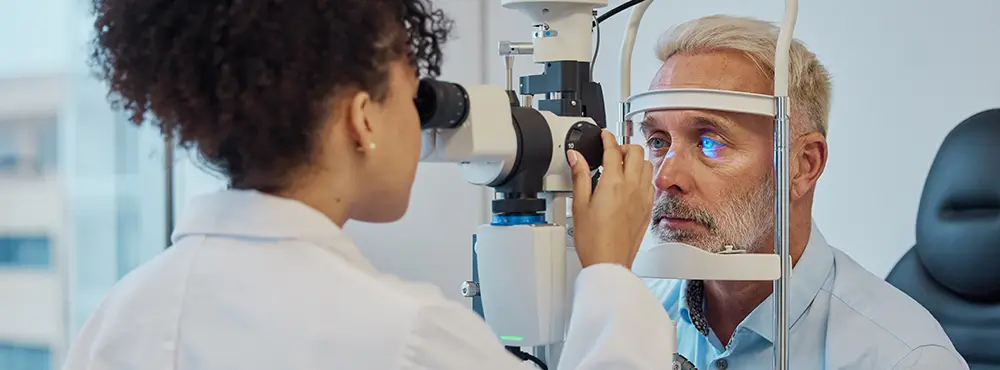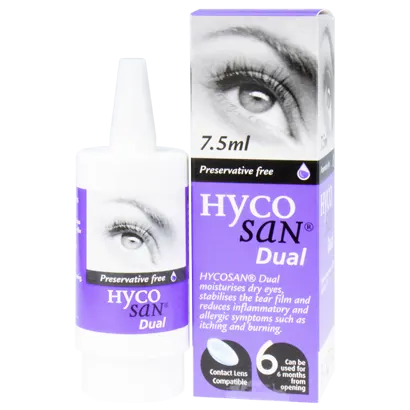
 Offers
Offers-
 Account
Account
-
0
 Favorite
Favorite
-
0
 Basket
Basket



Eye allergies can cause a range of uncomfortable symptoms including itching, redness and watery eyes. They can be triggered by a range of irritants/allergens; however, while they are irritating, most eye allergies are not dangerous and can be avoided or treated to relieve discomfort.
Eye allergies can also be referred to as allergic conjunctivitis or ocular allergies. They are usually sparked by the same irritants that cause sneezing, itchiness, runny noses and other symptoms among allergy sufferers.
The most common airborne allergens are mould, pollen, dust, and pet dander. When these irritate the conjunctivitis and eyelids then an eye allergy occurs. Eye allergies do not spread from person to person unlike different types of conjunctivitis. Eyes can still get irritated even though they do not come in direct contact with other allergens such as food and insect stings.
Eye allergies can also be caused by certain beauty products, makeup, and eye drops. Eye brighteners for cosmetic purposes and artificial tears to help with dry eyes can cause irritations. It's important to test products with small drops before using them in full. You should also read product labels and consult with your eye care professional in case of any doubt or concerns. Using preservative-free eye drops is also recommended and less likely to cause irritation.
Benjamin Franklin once said, "An ounce of prevention is worth a pound of cure". He also invented bifocals, so we'll take his word for it, as there are many things you can do to prevent allergies from flaring up.
There are many signs which indicate that your eye is having an allergic reaction. However, you can only be sure whether these symptoms are certainly related to an eye allergy by consulting your doctor or eye care professional for a medical diagnosis.
The symptoms of an eye allergy can include the following:
Sometimes eye allergy symptoms are accompanied by nasal allergies (i.e. itchy, stuffy nose and sneezing), and eczema; other times, they occur alone.
Allergens such as pet dander and pollen can cause your eyes to look red. When exposed to these, the mast cells in your eyes release histamine which causes your eyes to go red. Histamines can also cause watery and itchy eyes.
There are a variety of eye allergy triggers, including:
Though you may not be able to avoid an eye allergy altogether, there are several measures you can take to reduce its symptoms.
You can limit your outdoor exposure by:
You can limit your indoor exposure by:
You can limit your exposure to eye allergies caused by pets by:
You can help to manage your eye allergies by:
It is a good idea to seek advice from your doctor or optician as they can give you tailored advice based on your symptoms and discuss additional measures.
You may not be able to get rid of eye allergies for good; however, prescription eye drops, and medications can reduce the symptoms. Your doctor may prescribe the following as well as eye drops for allergies.
There are various eye drops which can help to relieve symptoms of eye allergies and it would be best to see an eye care professional to determine which ones are the best for you. Some are available over the counter at the pharmacy/optician and other stronger medicines need a prescription.
Hycosan Dual Eye Drops are preservative-free lubricant eye drops. Not only are these drops great for soothing dry eyes, but they also help reduce inflammation caused by allergies. These drops are Ideal for hay fever symptoms such as itching and burning. Great for contact lens wearers, these drops contain 0.05% Sodium Hyaluronate to provide long lasting lubrication, making your contact lens wear even smoother. The Hycosan Dual Eye Drops are a one-drop pump system bottle for less waste and easy application, with 225 drops per bottle.

You should not wear contact lenses if your symptoms are severe or if you have been advised your cornea is affected. You should always follow the advice given by your doctor or optician.
Typically, both eyes are affected by eye allergies. However, if only one eye came into contact with the allergen, you may find you have an allergy in one eye only. For example, if only one eye is rubbed with the allergen.
Eye allergies share characteristics associated with certain eye diseases which is why it is essential to get an accurate diagnosis. An allergist or ophthalmologist can conduct tests which will reveal whether or not these shared symptoms are the result of an eye allergy.
An eye allergy diagnosis may involve examining the eye with a microscope to see swollen blood vessels on the surface of the eye. Your ophthalmologist might also take a culture scraping from the conjunctiva to test for a certain type of white blood cells that signify an eye allergy.
Seasonal allergies usually last between 4-8 weeks during the pollen season. Other allergies can be triggered at any time. An allergic reaction can last for as long as you're exposed to the allergen.